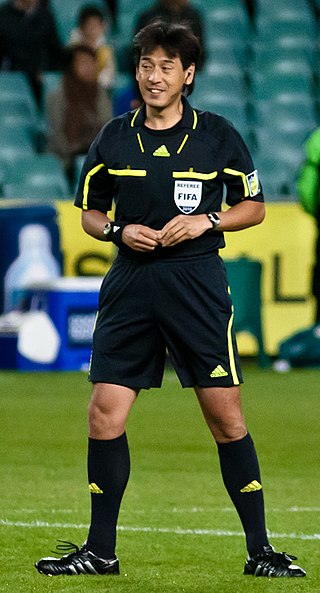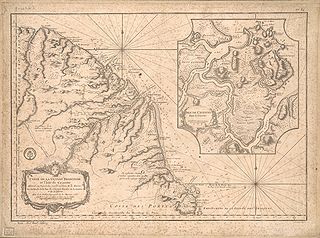
The Paraguayan War, also known as the War of the Triple Alliance, was a South American war that lasted from 1864 to 1870. It was fought between Paraguay and the Triple Alliance of Argentina, the Empire of Brazil, and Uruguay. It was the deadliest and bloodiest inter-state war in Latin American history. Paraguay sustained large casualties, but the approximate numbers are disputed. Paraguay was forced to cede disputed territory to Argentina and Brazil. The war began in late 1864, as a result of a conflict between Paraguay and Brazil caused by the Uruguayan War. Argentina and Uruguay entered the war against Paraguay in 1865, and it then became known as the "War of the Triple Alliance."
The Battle of Berne was a football match at the 1954 World Cup between Hungary and Brazil, a quarter-final played on 27 June 1954 at the Wankdorf Stadium in Bern, Switzerland. Violent conduct and fighting prompted English referee Arthur Ellis to send off three players during the match. Fighting between the teams continued in the dressing rooms after the final whistle.

Brazil competed at the 2004 Summer Olympics in Athens, Greece, from 13 to 29 August 2004. This was the nation's nineteenth appearance at the Summer Olympics, excluding the 1928 Summer Olympics in Amsterdam. The Brazilian Olympic Committee sent the nation's largest ever delegation in history to the Games. A total of 243 athletes, 124 men and 119 women, competed in 24 sports.

Ireland competed at the 2004 Summer Olympics in Athens, Greece, from 13 to 29 August 2004. This was the nation's eighteenth appearance at the Summer Olympics.

Brazil competed at the 1988 Summer Olympics in Seoul, South Korea. 160 competitors, 127 men and 33 women, took part in 106 events in 21 sports. Brazilians conquered 6 medals in Seoul, but only one gold medal.

The military history of Brazil comprises centuries of armed actions in the territory encompassing modern Brazil, and the role of the Brazilian Armed Forces in conflicts and peacekeeping worldwide. For several hundreds of years, the area was the site of intertribal wars of indigenous peoples. Beginning in the 16th century, the arrival of Portuguese explorers led to conflicts with the indigenous peoples; a notable example being the revolt of the Tamoio Confederation. Sporadic revolts of African slaves also marked the colonial period, with a notable rebellion led by Zumbi dos Palmares. Conflicts were fought with other European nations as well – two notable examples being the France Antarctique affair, and a conflict with the Netherlands in the early 17th century over control of much of Northeastern Brazil. Although Portugal retained its possessions during conflicts with other nations, it lost control of the colony after the Brazilian war of Independence, which led to the establishment of the Empire of Brazil.

Yuichi Nishimura is a Japanese football referee. He has refereed in the Japanese J. League Division 1 since 1999 and has been a full international referee for FIFA since 2004. He refereed at the 2010 FIFA World Cup, where he was appointed to several prestigious matches, including as fourth official on the final. He also refereed the opening game in the 2014 FIFA World Cup between hosts Brazil and Croatia, his poor performance in which was criticized. He refereed the second leg of the 2014 AFC Champions League final between Al Hilal and Western Sydney Wanderers in which his performance was heavily criticized also.

The Portuguese conquest of French Guiana, also known as Conquest of Cayenne, was a military operation against Cayenne, capital of the South American colony of French Guiana, launched in January 1809 in the context of the Napoleonic Wars. The invasion was undertaken by a combined expeditionary force that included Portuguese and British military contingents.

Brazil competed at the 2011 Pan American Games in Guadalajara, Mexico from October 14 to 30, 2011. Bernard Rajzman will be the Chef de mission. Brazil's team consisted of 521 athletes in 32 sports.

Brazil competed at the 2012 Summer Olympics in London, from 27 July to 12 August 2012. This was the nation's twenty-first appearance at the Summer Olympics, having missed the 1928 Summer Olympics in Amsterdam. The Brazilian Olympic Committee sent a total of 258 athletes to the Games, 136 men and 122 women, to compete in 24 sports. Brazil left London with a total of 17 Olympic medals, winning their third largest number of medals at a single games.

African Slave Trade Patrol was part of the Blockade of Africa suppressing the Atlantic slave trade between 1819 and the beginning of the American Civil War in 1861. Due to the abolitionist movement in the United States, a squadron of U.S. Navy warships and Cutters were assigned to catch slave traders in and around Africa. In 42 years about 100 suspected slave ships were captured.

The 2004 Ibero-American Championships in Athletics was the eleventh edition of the international athletics competition between Ibero-American nations which was held at the Estadio Iberoamericano in Huelva, Spain on 6–8 August 2004. A record high of 27 nations took part while the number of participating athletes (430) was the second highest in the competition's history after the 1992 edition. The programme featured 44 track and field events, 22 each for men and women, and 16 championship records were broken or equalled at the three-day competition.

Brazil participated in the 2011 Parapan American Games.

The 1994 Ibero-American Championships in Athletics was the sixth edition of the international athletics competition between Ibero-American nations which was held at the Estadio José María Minella in Mar del Plata, Argentina from 27–30 October.

The 1996 Ibero-American Championships in Athletics was the seventh edition of the international athletics competition between Ibero-American nations which was held at the Estadio Alfonso Galvis Duque in Medellín, Colombia from 9–12 May.

The 2000 Ibero-American Championships in Athletics was the ninth edition of the international athletics competition between Ibero-American nations which was held at the Estádio Célio de Barros in Rio de Janeiro, Brazil on 20 and 21 May. With a total of 308 athletes, the number of competitors was the lowest since 1990. The Spanish team was much smaller than previous delegations as most of the Spaniards chose to focus on the 2000 Sydney Olympics instead. Other national teams used the competition as a chance to gain an Olympic qualifying mark.

The 2002 Ibero-American Championships in Athletics was the tenth edition of the international athletics competition between Ibero-American nations which was held at the Estadio Cementos Progreso in Ciudad de Guatemala, Guatemala on 11 and 12 May. A total of 328 athletes participated in the 44-event programme. The 3000 metres was introduced for both men and women, replacing the longer 10,000 metres event.

Spain competed at the 2012 Summer Paralympics in London, United Kingdom, from 29 August to 9 September 2012.
The Romani people in Brazil are known by non-Romani Brazilians as ciganos, or alternatively by terms such as boêmios, judeus and quicos, in various degrees of accuracy of use and etymology as well as linguistic prestige.

The Recapture of Recife was a military engagement between the Portuguese forces under Francisco Barreto de Meneses and the Dutch forces of Captain Walter Van Loo. After the Dutch defeats at Guararapes, their surviving men, as well as other garrisons of New Holland, joined in the area of Recife (Mauritsstad) in order to make a last stand. However, after fierce fighting, the Portuguese victoriously entered the city and the remaining Dutch were ousted from Brazil.















